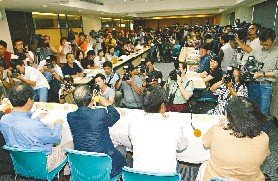Bevin Chu
July 17, 2006

數名親綠學者、社團人士,包括台大社會系助理教授范雲(右起)、中研院台灣史研究所助研究員吳叡人、前美麗島雜誌總編輯張富忠、中研院社會所研究員吳乃德、清大社會所副教授吳介民與婦女新知董事長黃長玲等人,昨天舉行記者會,要求陳水扁總統主動請辭下台。
Caption: Several pro green scholars and NGO leaders, including National Taiwan University Assistant Professor Fan Yun (far right), Academia Sinica Taiwan History Research Institute Assistant Researcher Wu Rui-ren, former Formosa Magazine Editor-in-Chief Chang Fu-chung, Academia Sinica Social Science researcher Wu Nai-teh, Qinghua University Social Science Associate Professor Wu Chieh-min and Women's Studies Chairman Huang Chang-ling, yesterday held a press conference, asking President Chen Shui-bian to resign on his own initiative.
The banner on the wall reads: "yi min zhu feng fu tai wan ren tong," i.e., "using democracy to enrich identification with Taiwan"
Source: UDN News

Deep Green Academics turning on Chen is obviously considered news
So Deep Green ("mo lu" i.e., "ink green") academics have finally turned on Chen Shui-bian.
It's about time.
On principle alone, these Deep Green academics should have turned on Chen long ago, certainly long before Lee Teng-hui and the TSU.
Why didn't they?
Could it be that even for Deep Green academics, who habitually adopt a holier than thou attitude toward their Pan Blue colleagues, Pan Green Political Correctness nevertheless trumps moral principles?
On the one hand, "better late than never."
On the other hand, these Deep Green academics are "a day late and a dollar short."
These Deep Green academics are a day late in the sense that they have been far too tardy in speaking up against flagrant Pan Green corruption. Had they been authentic men and women of conscience, they would have spoken up in March 2004, when Chen perpetrated his patently phony "Wag the Dog" shooting hoax on ROC voters.
But tardiness is hardly their most serious shortcoming. Their most serious shortcoming is that in addition to being a day late, these Deep Green academics have still come up a dollar short.
As the banner on the wall behind them unwittingly reveals, these Deep Green academics still haven't seen the light. The banner these ostensibly high-minded Deep Green academics tacked on the wall reads "yi min zhu feng fu tai wan ren tong," i.e., "using democracy to enrich identification with Taiwan."
Did you get that?
These Deep Green academics were not "using identification with Taiwan to enrich democracy," but "using democracy to enrich identification with Taiwan."
By their own admission, "democracy" was merely a useful means to their real end, their real end being "identification with Taiwan," and by implication, "disidentification with China."
In short, here we are again, right back at the Taiwan independence movement's most primitive, most atavistic core value -- its artificially concocted, petty tribalist, "Taiwanese, not Chinese" identity politics.
These Deep Green academics' minds are so addled by "ben tu" or "nativist" orthodoxy, they no longer realize the moral reprehensibility of their political appeal.
Think about it for a moment. What exactly are they demanding?
They're demanding the establishment of a political system explicitly rooted in tribal identity, in which a "ben tu" or "native" ethnic identity is the supreme value.
They're demanding furthermore, that their political system, rooted in "nativist" ethnic bigotry, be "enriched" with the trappings of "democracy."
Their disaffection with Chen Shui-bian as a nativist fuhrer does not reflect an enlightened realization that their nativist political agenda is morally reprehensible to begin with.
Their disaffection with Chen Shui-bian merely reflects their belated realization that a nativist fuhrer whose rampant corruption can no longer be swept under the rug is a public relations liability rather than asset.
In other words, these Deep Green academics have no objection to a bigoted nativist demagogue demanding "Taiwanese nation building," based on an ersatz "Taiwanese national identity."
On the contrary, they closely identify with and enthusiastically approve of Chen's nativist political agenda. Chen's agenda is their agenda.
After all, these same Deep Green academics didn't complain about Chen Shui-bian during the last six years, while he was making exactly the same nativist political appeals that he's making this year.
These Deep Green academics merely object to a nativist demagogue whose badly tarnished public image has become an obvious detriment to their nativist political agenda.
Am I exaggerating? Am I distorting their position?
Hardly.
As the militantly nativist Taipei Times put it:
The academics said that the president failed to clarify the corruption scandals and lost his ability to solve the country's crisis as a leader of pro-localization forces. [emphasis added]
A few of my Pan Blue comrades, including Pan Blue pundits and Pan Blue political leaders, have expressed approval of the Deep Green academics' stand against Chen and the DPP.
I beg to differ.
The moral defect at the heart of the Taiwan independence movement is its atavistic appeal to primitive bigotry.
What these Deep Green academics are demanding is not that this nativist bigotry be repudiated as fundamentally immoral.
What these Deep Green academics are demanding is that this nativist bigotry be given a public relations makeover.
What these Deep Green academics want is a fuhrer with a cleaner image.

Adolf Hitler, Fuhrer of the Aryan People

Chen Shui-bian, Fuhrer of the Hoklo People
The late Barry Goldwater once said that "extremism in the defense of liberty is no vice."
One might well add that "integrity in the service of bigotry is no virtue."
Published on TaipeiTimes
Pan-green academics turn on Chen
A HOUSE DIVIDED: While the academics called for Chen to seriously consider stepping down, other groups were planning a similar conference to counter the motion
Sunday, July 16, 2006
After surviving a recall motion initiated by the pan-blue camp last month, President Chen Shui-bian (陳水扁) is facing his toughest political challenge yet as his own camp appears divided on whether he should step down amid allegations of corruption involving his family and close aides.
A group of pan-green academics yesterday held a press conference urging Chen to take political and moral responsibility and seriously consider stepping down, while another pro-green group was mulling whether to hold a press conference tomorrow to counter the former's motion.
A statement entitled "Democracy and the Moral Crisis of Taiwanese Identity -- Our Appeal to the President, the Ruling Party and Taiwanese Citizens," was released yesterday at the press conference by a number of pan-green academics.
Group member Fan Yun (范雲), quoting from the statement, said: "We expect President Chen to realize how heavy his responsibility is as a president ... When he loses credibility and the trust of the people, we urge him to seriously consider resigning from his post."
Together with a signature drive launched earlier this week, which has attracted more than 4,000 signatures, the group pressed for the president to resign voluntarily in order to "set a good example and make a contribution to Taiwan's democracy."
Wu Nai-teh (吳乃德), one of the academics and the younger brother of former Taiwan Stock Exchange chairman Wu Nai-jen (吳乃仁), denied the move was an "anti-Chen Shui-bian movement."
He said that seeking a more mature democracy and Taiwanese identity were the ultimate goal.
"Taking down the president is not the objective. What we want is to raise the quality of Taiwan's democracy," he said
Wu added that Chen's resignation on his own initiative would help raise the quality of democratic politics.
Chang Fu-chung (張富忠), editor in chief of Formosa magazine and a pro-democracy movement veteran, lashed out at the Democratic Progressive Party (DPP) for "sinking into depravity" over the past six years as the ruling party.
Chang also said that the DPP had drifted away from its spirit and ideals established during the dangwai ("outside the party," 黨外) democratic movement period.
Chang questioned the DPP's silence on recent corruption cases involving the president's family members and close aides in an attempt to protect Chen.
"Where is the party's self-critical spirit now?" he said.
The academics said that the president failed to clarify the corruption scandals and lost his ability to solve the country's crisis as a leader of pro-localization forces.
If the president shrugged off their appeal and refused to step down, Wu Rwei-ren (吳叡人), a researcher at Academia Sinica, said the group would continue the signature drive, while Lee Ting-tsan (李丁讚), a sociology professor at National Tsinghua University, suggested that the DPP should revoke Chen's party membership.
While the group's online signature drive has attracted thousands of signatures over the past two days, the Web site's lack of an identity verification system has allowed some mischief makers into the site. Names like Chen Shui-bian, Vice President Annette Lu (呂秀蓮), and even US President George W. Bush were spotted on the petition before being removed.
Meanwhile, Chinese Nationalist Party (KMT) Chairman Ma Ying-jeou (馬英九) yesterday said that the group's view is similar to that of the pan-blue camp.
"But the same remarks made by the pan-blue camp were twisted as ethnic or political clashes ... Now that the pro-green academics have come out and made their statement, it's easier to see the problem," Ma said after presiding over a municipal event.
Other pan-green groups, however, disagreed with the academics' view. These include the Northern Society and the Southern Society, which are planning to hold a news conference tomorrow to present their opposing views.
Meanwhile, Chen will invite key players within his administration and party, legislators as well as city and county chiefs tomorrow to discuss the latest political development.
Cho Jung-tai (卓榮泰), deputy secretary-general of the Presidential Office, said yesterday that the president attaches great importance to the academics' views "which are the expression of ideals," and that he will seek to "communicate more with them."
But with regards to allegations that the president was lacking in "self-reflection," Cho said, "this is far from true."
DPP legislators yesterday expressed hope that the president will hear the "true voice of the grassroots" in tomorrow's meeting.
DPP caucus whip Chen Chin-jun (陳景峻) said the president should try to fully understand the will of the people and the public's perception about his son-in-law, Chao Chien-ming (趙建銘). Chao was indicted on insider trading charges on July 10. He was released on NT$10 million bail that evening after being detained for 47 days.
One DPP legislator who requested anonymity said the president had called for similar meetings before whenever he ran into difficulties, but the meetings ended with no results.
DPP Legislator William Lai (賴清德) said that by listening to the views of the people, President Chen could help the first family and the DPP overcome current difficulties.
Lai hoped the president would listen closely to all views, instead of "lecturing" as in the past; otherwise, "no one will take part in such meetings anymore."
DPP Legislator Wang Hsin-nan (王幸男) also said that "it is never too late to reform and to reflect," and the president should "listen to the voice of those who used to love and pamper him."
No comments:
Post a Comment